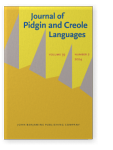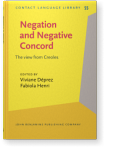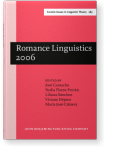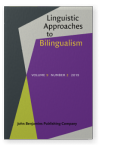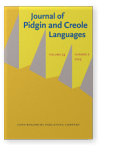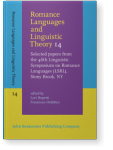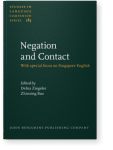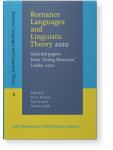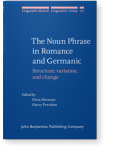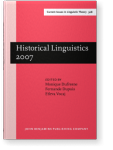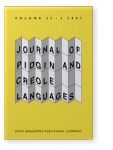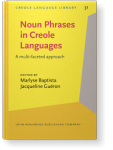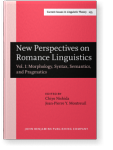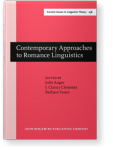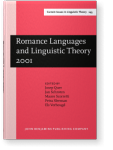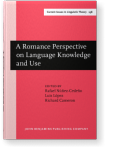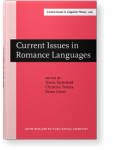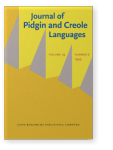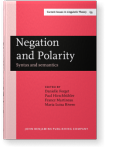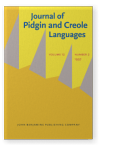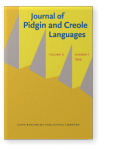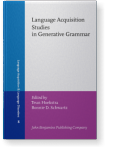Viviane Déprez
List of John Benjamins publications for which Viviane Déprez plays a role.
Journal
Titles
Negation and Negative Concord: The view from Creoles
Edited by Viviane Déprez and Fabiola Henri
[Contact Language Library, 55] 2018. x, 327 pp.
Subjects Creole studies | Semantics | Syntax | Theoretical linguistics
Romance Linguistics 2006: Selected papers from the 36th Linguistic Symposium on Romance Languages (LSRL), New Brunswick, March-April 2006
Edited by José Camacho, Nydia Flores-Ferrán, Liliana Sánchez, Viviane Déprez and María José Cabrera
[Current Issues in Linguistic Theory, 287] 2007. viii, 340 pp.
Subjects Romance linguistics | Theoretical linguistics
2019 Pragmatic abilities in bilinguals: The case of scalar implicatures Linguistic Approaches to Bilingualism 9:2, pp. 314–340 | Article
The experimental literature on the pragmatic abilities of bilinguals is rather sparse. The only study investigating adult second language (L2) learners (Slabakova, 2010) found an increase of pragmatic responses in that population relative to monolinguals. The results of studies on early… read more
2019 Plurality and definiteness in Mauritian and Haitian creoles Journal of Pidgin and Creole Languages 34:2, pp. 287–345 | Article
In addition to plurality, creole plural morphemes impart an additional meaning of definiteness or specificity to the nominal expressions they mark. As of yet, there is no precise characterization either empirical or theoretical of the semantic/pragmatic dimensions they convey. Furthermore, the… read more
2018 What is negative in Haitian Creole? Negative Concord Items, sentential, constituent and expletive negation Negation and Negative Concord: The view from Creoles, Déprez, Viviane and Fabiola Henri (eds.), pp. 33–68 | Chapter
Negative sentences in Creole languages, provocatively claimed to be the world ‘simplest languages’ (Mc Whorter 2001), commonly present a puzzling multiplicity of redundant negative expressions with a single negative interpretation that appear to systematically violate logical compositionality. An… read more
2018 Negation and negative concord: The view from creoles Negation and Negative Concord: The view from Creoles, Déprez, Viviane and Fabiola Henri (eds.), pp. 1–8 | Introduction
2018 Conclusions Negation and Negative Concord: The view from Creoles, Déprez, Viviane and Fabiola Henri (eds.), pp. 313–323 | Chapter
2018 Chapter 3. French negative concord and discord: An experimental investigation of contextual and prosodic disambiguation Romance Languages and Linguistic Theory 14: Selected papers from the 46th Linguistic Symposium on Romance Languages (LSRL), Stony Brook, NY, Repetti, Lori and Francisco Ordóñez (eds.), pp. 35–51 | Chapter
Evidence that DN readings arise in solid NC languages more than previously thought (Déprez et al. 2015) underscore the importance of investigating the factors governing their emergence to deepen our understanding of Negative Concord. This paper examines the roles of context and prosody in… read more
2017 What is Strict Negative Concord? Lessons from French Based Creoles Negation and Contact: With special focus on Singapore English, Ziegeler, Debra and Zhiming Bao (eds.), pp. 81–114 | Article
Two empirical predictions derive from current accounts of Strict Negative Concord; either their NCI should be universal expressions out-scoping negation, or their doubling negation should be expletive. Based on a comparative analysis of Strict NC in Haitian Creole (HC) and Mauritian Creole (MC),… read more
2012 Interfacing information and prosody: French wh-in-situ questions Romance Languages and Linguistic Theory 2010: Selected papers from 'Going Romance' Leiden 2010, Franco, Irene, Sara Lusini and Andrés Saab (eds.), pp. 135–154 | Article
We present experimental evidence bearing on Cheng and Rooryck’s (2000) proposal that French wh-in-situ questions are licensed by an intonational morpheme also present in yes-no questions and their claim that such questions are ungrammatical without a rising contour. While most participants produced… read more
2011 From N to D: Charting the time course of the internal rise of French n-words The Noun Phrase in Romance and Germanic: Structure, variation, and change, Sleeman, Petra and Harry Perridon (eds.), pp. 257–280 | Article
Based on a thorough review of their feature make up and on novel diachronic data on their modification properties, this paper maps out the internal syntactic structure of French n-words and the historical time course of their internal rise within a nominal projection. It charts out precise steps… read more
2009 (Un)-interpretable features and grammaticalization Historical Linguistics 2007: Selected papers from the 18th International Conference on Historical Linguistics, Montreal, 6–11 August 2007, Dufresne, Monique, Fernande Dupuis and Etleva Vocaj (eds.), pp. 83–98 | Article
To explain the diverse distribution of determiners in French Based Creoles (FBC) a formal model of grammaticalization is proposed in which grammaticalization is taken to encode a change in the interpretability of one or more of the features in a lexical item. Here interpretability is understood as… read more
2007 Parenthetical null topic constructions in Romance Romance Linguistics 2006: Selected papers from the 36th Linguistic Symposium on Romance Languages (LSRL), New Brunswick, March-April 2006, Camacho, José, Nydia Flores-Ferrán, Liliana Sánchez, Viviane Déprez and María José Cabrera (eds.), pp. 1–14 | Article
2007 Nominal constituents in French lexifier creoles: Probing the structuring role of grammaticalization Journal of Pidgin and Creole Languages 22:2, pp. 263–307 | Article
The paper offers a comparative study of the syntactic structure of nominal constituents in French Lexifier Creoles (FLC). In spite of the superficial variability observed in the distribution of FLC determiners, the paper argues that FLC have a common functional architecture and presents both… read more
2007 11. Implicit determination and plural Noun Phrases in Creole Languages: A multi-faceted approach, Baptista, Marlyse and Jacqueline Guéron (eds.), pp. 301–336 | Chapter
The paper explores and compares the distributions and interpretations of nominal expressions without determiner (bare nouns) in a number of French based creole and in one Portuguese based creole, Cape Verdean creole. The goal of this exploration is to determine on the one hand whether the range of… read more
2006 On the Conceptual Role of Number New Perspectives on Romance Linguistics: Vol. I: Morphology, Syntax, Semantics, and Pragmatics, Nishida, Chiyo and Jean-Pierre Y. Montreuil (eds.), pp. 67–82 | Article
Bouchard (2002) proposes that the syntactic position of number — on N or D — affects three aspects of nominal syntax: adjective-order, nounomission and Bare Argument Nominals (BAN). This paper shows that number position incorrectly predicts these nominal properties in some languages, i.e. the… read more
2004 Micro-Parametric Variation and Negative Concord Contemporary Approaches to Romance Linguistics: Selected Papers from the 33rd Linguistic Symposium on Romance Languages (LSRL), Bloomington, Indiana, April 2003, Auger, Julie, J. Clancy Clements and Barbara Vance (eds.), pp. 139–158 | Article
2003 Determiner Architecture and Phrasal Movement in French Lexifier Creoles Romance Languages and Linguistic Theory 2001: Selected papers from 'Going Romance', Amsterdam, 6–8 December 2001, Quer, Josep, Jan Schroten, Mauro Scorretti, Petra Sleeman and Els Verheugd-Daatzelaar (eds.), pp. 49–74 | Article
2003
Constraints on the meanings of Bare Nouns
A Romance Perspective on Language Knowledge and Use: Selected papers from the 31st Linguistic Symposium on Romance Languages (LSRL), Chicago, 19–22 April 2001, Núñez-Cedeño, Rafael, Luis López and Richard Cameron (eds.), pp. 291–310 | Article2002 On the nature of bare nouns in Haitian Creole Current Issues in Romance Languages: Selected papers from the 29th Linguistic Symposium on Romance Languages (LSRL), Ann Arbor, 8–11 April 1999, Satterfield, Teresa, Christina Tortora and Diana Cresti (eds.), pp. 47–64 | Article
1999 Empirical Quicksand or Empirical Smokescreen? Journal of Pidgin and Creole Languages 14:2, pp. 371–377 | Miscellaneous
1997 A Non-Unified Analysis of Negative Concord Negation and Polarity: Syntax and semantics. Selected papers from the colloquium Negation: Syntax and Semantics. Ottawa, 11–13 May 1995, Forget, Danielle, Paul Hirschbühler, France Martineau and María Luisa Rivero (eds.), pp. 53–74 | Article
1997 Predicative Constructions and Functional Categories in Haitian Creole Journal of Pidgin and Creole Languages 12:2, pp. 203–235 | Article
This paper seeks to provide a unified analysis of the particle se in Haitian Creole, traditionally identified as an equality marker, a resumptive pronoun, or a focus marker. This study also serves to illustrate the role and the structural organization of functional projections in this… read more
1994 Haitian Creole: A Pro-Drop Language? Journal of Pidgin and Creole Languages 9:1, pp. 1–24 | Article
Haitian Creole has been argued to be a pro-drop language whose null subjects are licensed by syntactic clitics (DeGraff 1993). This paper analyzes the properties of Haitian Creole pronominal subjects, expletive and argumentai, and argues on the basis of syntactic, phonological, and comparative… read more
1994 Crosslinguistic Evidence for Functional Projections in Early Child Grammar Language Acquisition Studies in Generative Grammar, Hoekstra, Teun and Bonnie D. Schwartz (eds.), pp. 57–84 | Article
